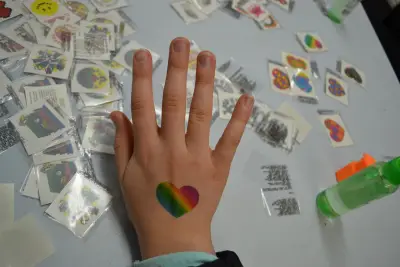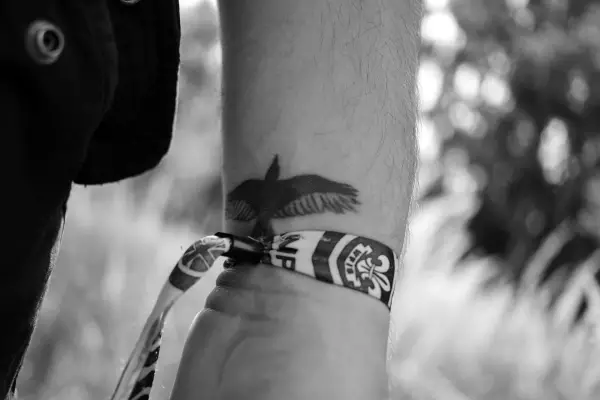I was teaching high school English in Roanoke, Virginia around 2011 the first time I encountered teens with tattoos. Having just left my position in the Los Angeles area, this was ironic to me, but also a sign of the times to come. If you’re wondering if you should let your son get a tattoo, then please keep reading.
Don’t waste time wondering if you should let your son get a tattoo. If he’s old enough, he won’t need your permission, so it’s out of your hands. But if he’s under 18 or young enough to require your permission, then the answer should be no. It really is that clear: Your underage son should wait.

As a mom of sons and a retired teacher who’s spent most instructional years at the middle and high school level, I’m well aware of the enticement surrounding tattoos (and other body arts like piercings and gauges). I also happen to have two tattoos of my own.
I’m happy to share my perspective on this touchy and mysterious topic, given my unique background. Let’s look at reasons for getting tattoos; problems associated with tattoos; and why anyone under the age of adulthood should wait before committing to tattoos.
Contents
What do you do if your son wants a tattoo?
From rappers to actors to the latest Tik Tok influencers, it seems, to your kids at least, that ‘everyone has tattoos.’ And to some degree, it’s kind of true. Whether you’re watching Inked (about pro skater Corey Hart and his tattoo business, which you can still catch on Amazon Prime) or the local news, you’re likely to see someone with a tattoo.
If your son (or daughter) wants a tattoo, you should not argue with them, but still make it clear that they wait until adulthood. After that, discuss their reasons for wanting a tattoo as well as the dangers and problems with tattooing. No matter what, you want your child to be informed and safe.
Steps to Take If Your Son Wants A Tattoo:
- Don’t argue. You’re the parent and in charge, so the ‘boss’ has no need to argue the point.
- Be firm and clear.
- Be on the same page with your spouse, so it may mean you and your spouse discuss it privately first.
- Give your explanation according to your child’s age. The younger the child, the less you should explain because he won’t understand a long diatribe about it. For older kids, it’s probably helpful to provide some reasoning behind your ‘no’, but again, it’s not to justify or debate the issue.
- Don’t belittle or put down having tattoos because that will only make it more appealing, especially to teens.
- If you have tattoos, don’t fall for your child calling you a hypocrite. In fact, use your experience as evidence. It proves you aren’t prejudice against tattoos and also is an example of how your child has plenty of time to get a tattoo….later in life!
- Discuss your child’s interests in tattoos. You can even help him decide on potential tattoos for when he does get one.
So let’s now look at some specific ages and stages when your son might want a tattoo and how to handle it appropriately.
You might also enjoy these sons articles from Little Ninja Parenting:
- Are Sons Closer to Mothers or Fathers? (Explained)
- My Son Wants To Live With His Dad (Mom Explained)
- Your Son Vs My Son- Parental Rivalries & Living Vicariously
- When Should I Let My Son Date? (Unexpected Response)
What if your young son wants a tattoo?
Often it’s young kids who first talk about wanting tattoos. Even my 5-year-old granddaughter told me she wants tattoos, along with blue spikey hair. I told her maybe when she’s twelve, which seemed to satisfy her and I’m assuming by then she’ll have forgotten Oma gave her permission!

If your young son (or daughter) wants a tattoo, of course say no, or give them some obscure, easily forgotten, age. But you can still talk to him (or her) about why they want a tattoo (the answer may be nonsensical at this stage); what kinds of tattoos they like best; and also about tattoo safety.
Many young children want a tattoo because their moms and dads have them.
It’s common for kids to want to be like their parents, so if dad is sporting a dragon down his leg, it’s not surprising that his son views tattoos as cool.
However, kid must learn that just because dad (or mom) does something, it doesn’t make it okay or acceptable for them. And most kids learn this pretty quickly, even if they don’t always like it.
From alcohol to bed times to curfews to tattoos, kids and parents have different sets of rules to live by, and you don’t have to justify that.
But, you can satisfy your little ones affections for tattoos with kid-friendly temporary tattoos (here’s some from Amazon). Kids love these; I can attest to using them many times with my own kids, as well as students.
Just be sure to read the removal directions carefully, because some of these last quite a long time!

Should you let your 16-year-old son get a tattoo?
The issue of letting your son get a tattoo often becomes ‘real’ when he’s around sixteen or seventeen. So what should you do? After all he can drive a car and work a part-time job at 16 years old, shouldn’t he be allowed to get a tattoo?
If your 16-year-old son (or daughter) wants a tattoo, you should say no, just like if your child were five or twelve years old. Teens are still kids, and shouldn’t be making permanent lifestyle choices. Yet, it’s good to discuss his/her interest in tattoos, tattoo design, and tattoo safety.

Your sixteen-year-old will likely think he’s old enough to make his own fashion choices and many consider tattoos a fashion statement. However, getting a tattoo is much different from wearing hair long or short; coloring your hair; and donning ripped jeans.
Getting a tattoo is not like driving a car. You can stop driving a car anytime; and you can switch cars or upgrade them. Tattoos are not cars. You’ll have the same tattoo your whole life!
In addition to these points on tattoos, you can explain how it’s probably illegal, too. And there’s absolutely no good reason to promote your underage child from doing anything illegal.
Here are some examples of the age of legal consent for getting a tattoo.
| Legal At 14 | Legal At 16 | Legal At 18 |
|---|---|---|
| Idaho | Florida | Alaska |
| Nevada | Kansas | Arkansas |
| Louisiana | California | |
| New Jersey | Delaware | |
| Georgia | ||
| New York | ||
| Tennessee | ||
| Texas |
While states differ on legal tattoo age and it can change from year to year, so to be certain, look it up in your area. One thing is clear, though, most states are in agreement that tattooing under age of 18 isn’t a good idea, considering their stance on the issue.
Tips for Dealing With Your 16-Year-Old Son About Tattoos:
- Keep communication open, so that your son doesn’t sneak around.
- Be clear about your expectations.
- If necessary, provide possible consequences in advance so that he knows how serious you are on the subject.
- Talk about tattoo interest; often teens just want to be heard.
- If you have tattoos yourself, talk about things you wished you had done differently (or not) in order to provide a personal connection to the discussion.
- You might even want to offer a ‘bribe’ that you’ll help pay for the tattoo when he’s older, in order to show your commitment, but this should be conditional upon your circumstances.
Should you let your 18-year-old son get a tattoo?
So what about your 18-year-old son? Do parents even have a say about sons this age getting a tattoo?
If your 18-year-old son (or daughter) wants a tattoo, it’s ultimately their choice in most states. However, if as parents, you’re still providing all expenses and care, you should feel like you have a say so. It depends on how far you want to exert control. Keeping communication open is key though.
Suggestions If Your 18-Year-Old Son Wants A Tattoo:
- Discuss his motivation. If it’s just superficial, you might want to push back more.
- Talk about what kind of tattoo he wants. There’s a difference in getting a tattoo on the upper shoulder versus one on the neck or forearms.
- Figure out who’s going to pay for it. Tattoos are very expensive in most cases. And who really wants a discount tattoo? Your son may have to wait awhile to cover the costs of a quality tattoo; and you can even offer to pay for it if he waits until his 21st birthday for example. At least this gives more time before he does something permanent.
- If your child hasn’t graduated high school yet, look into school dress code policies too to ensure there’s not a prohibition on tattoos, or if there is, you can use that to postpone the inevitable, so to speak.
- It may be that you don’t mind at 18 years of age for your son to get a tattoo, so the best thing to do here, is to make sure he’s going to be safe and use a reputable tattoo artist/shop.
Our oldest son talked a long time about getting a tattoo, and his interest in tattoos made sense since both his dad and I have tattoos. However, despite us both liking tattoos, we stressed he had to wait until he was older because it’s a lifelong decision.
I got my first tattoo in my mid-30s!
So our son waited until after turning 21 to get his first tattoo, and also until he could pay for it entirely himself. He asked for our input about what to get; bounced his ideas off of us; and then made a good choice that worked for him. He now sports a really intricate design design on his upper arm and has no regrets.
Why do some parents get mad if their son wants a tattoo?

Even though tattoos have become more acceptable and noticeable in modern society, research shows having a tattoo is a sign of risk-taking behavior. This is one main reason some parents don’t like tattoos.
Many parents get mad or upset if their son or daughter wants a tattoo because it’s a permanent decision, which they fear their child will likely regret later. Tattoos are also expensive and can be oft-putting in the professional world since tattoos are commonly associated with gangs and drug use.
Research also shows that:
- More men have tattoos, though women age 20-29 have the highest rates of tattooing.
- Smokers are more likely to have tattoos than non-smokers.
- Men with lower education and/or trades jobs have a higher likelihood of being tattooed.
- The primary reason for getting a tattoo is ‘personal’, and that the tattoo has specific meaning to them.
- Religion is given as the main reason for those who say they don’t want a tattoo.
Problems With Getting Tattoos
So what are some of the problems with getting tattoos that you should discuss with your son or daughter?
Common problems with getting tattoos are misspelled words or bad art; infections afterwards; not properly caring for them; and getting tattoos on impulse. Some problems can be corrected easily, while others may be expensive and time-consuming, or require medication. And, some can’t be fixed at all.
Tips for Minimalizing Tattoo Problems:
- Vet the tattoo artist and shop by reading reviews; looking at lots of their work; and even checking with the local Better Business Bureau for any complaints.
- Be sure of what you want. Don’t decide on a tattoo haphazardly. One way to be careful is to make a choice, and then, wait several weeks to months to ensure you still feel the same way.
- Read up on how to care for your tattoo properly. This helps prevent infections, and it helps to prolong the vibrancy and ‘look’ of your tattoo (prevent fading).
- If you are using any language on your tattoo, double and triple check spellings. This is especially important for foreign words or words that are frequently misspelled.
- Make a good choice about where to put your tattoo. Often the tattooist can help with this.
- Think ahead, too. Some careers and professions have restrictions about visible tattoos.
The Takeaway for Letting Your Son Get A Tattoo
So the takeaway is this: if your son is underage, you should not allow your son to get a tattoo. Even if you are ‘pro tattoo’ like I am, it’s best for your son to wait until he’s an adult before making such a permanent decision. He has a lifetime to get tattoos, so it’s not something to rush.
For older sons, talk to him about his tattoo interests, just like you would about anything else that matters to him. This is how you guide and support older ‘children’. It’s just good parenting!
For more Little Ninja Parenting articles about sons, I suggest these next:
- Are Sons Closer to Mothers or Fathers? (Explained)
- My Son Wants To Live With His Dad (Mom Explained)
- Your Son Vs My Son- Parental Rivalries & Living Vicariously
- When Should I Let My Son Date? (Unexpected Response)
Source Credit: Legal status of tattooing in the United States
